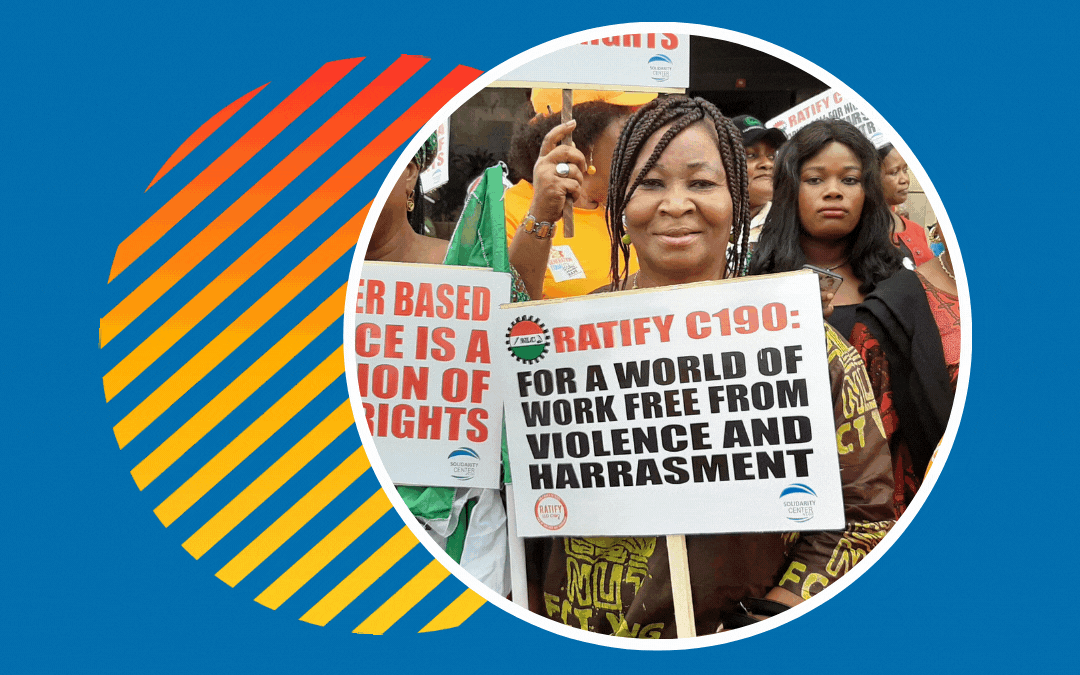
Nov 17, 2021
Union women are not waiting for their governments to ratify Convention 190, the international treaty that addresses gender-based violence and harassment in the world of work—they are taking action now to ensure workers benefit from the powerful rights it provides, according to Rita Goyit, speaking on this week’s Solidarity Center Podcast.
“We are taking concrete measures while we wait for the ratification,” says Goyit, head of the Nigeria Labor Congress (NLC) Department of Women and Youth and secretary of the NLC’s National Women Commission.
With support of the NLC and Solidarity Center, union activists conducted an informal survey of more than 900 women workers in Abuja and Lagos and found 57 percent had experienced GBVH at work, yet 20 percent did not report it for fear of employer retaliation.
“What was common about the story is that sexual harassment, gender-based violence exists in the workplace,” Goyit tells Solidarity Center Executive Director and podcast host Shawna Bader-Blau. “And it was not treated as a workplace issue.”
Through outreach and training, Nigerian unions are reaching workplaces as diverse as garment factory floors and sprawling informal markets, where workers put in place what works for them, like anonymous suggestion boxes to report harassment.
Goyit says union women are developing strategies that “will really address gender-based violence in the workplace because this is a worker-specific issue, it’s coming from with the workers ourselves.
“We’re putting our heads together until we find the solution … because the women are with us. Because I feel strong when I see the other women around me in our campaigns, in the negotiations that we do.”
More from The Solidarity Center Podcast!
Listen to this and all Solidarity Center episodes here or at Spotify, Amazon, Stitcher, Castbox or wherever you subscribe to your favorite podcasts.
Download recent Season Two episodes:
The Solidarity Center Podcast, “Billions of Us, One Just Future,” highlights conversations with workers (and other smart people) worldwide shaping the workplace for the better.
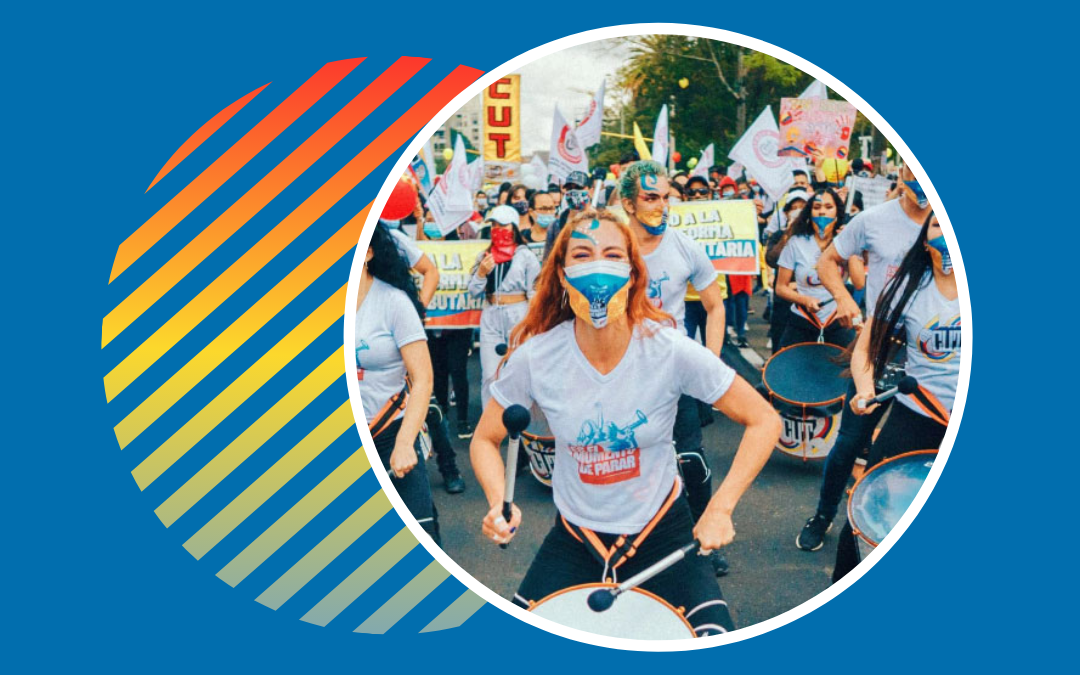
Nov 3, 2021
Police violence, which escalated during COVID-19, is part of a rising tide of global crackdowns targeting marginalized communities, workers and young people struggling to support themselves. The latest episode of The Solidarity Center Podcast looks at how workers in Colombia and Nigeria—targeted by police brutality as they staged peaceful protests to address inequality—are joining and leading large movements to demand new levels of accountability from and reform of the authorities charged with protecting and serving their communities.
Podcast host and Solidarity Center Executive Director Shawna Bader-Blau talks with Francisco Maltés, president of the Unitary Workers Center (CUT) in Colombia, and Gbenga, general secretary and founder of the Federation of Informal Workers’ Organizations of Nigeria. They describe how workers, especially those living most on the edge, are taking back their communities by standing up for justice and opposing decades of widespread, systemic corruption that feeds off state-sponsored violence.
“Justice and police activity in Colombia can be characterized as being directed at poor people,” says Maltés. “The National Strike Committee has proposed a bill for reforming the national police force.”
Catch More from Season Two!
Listen to this and all Solidarity Center episodes here or at Spotify, Amazon, Stitcher, Castbox or wherever you subscribe to your favorite podcasts.
Catch recent Season Two episodes:
The Solidarity Center Podcast, “Billions of Us, One Just Future,” highlights conversations with workers (and other smart people) worldwide shaping the workplace for the better.
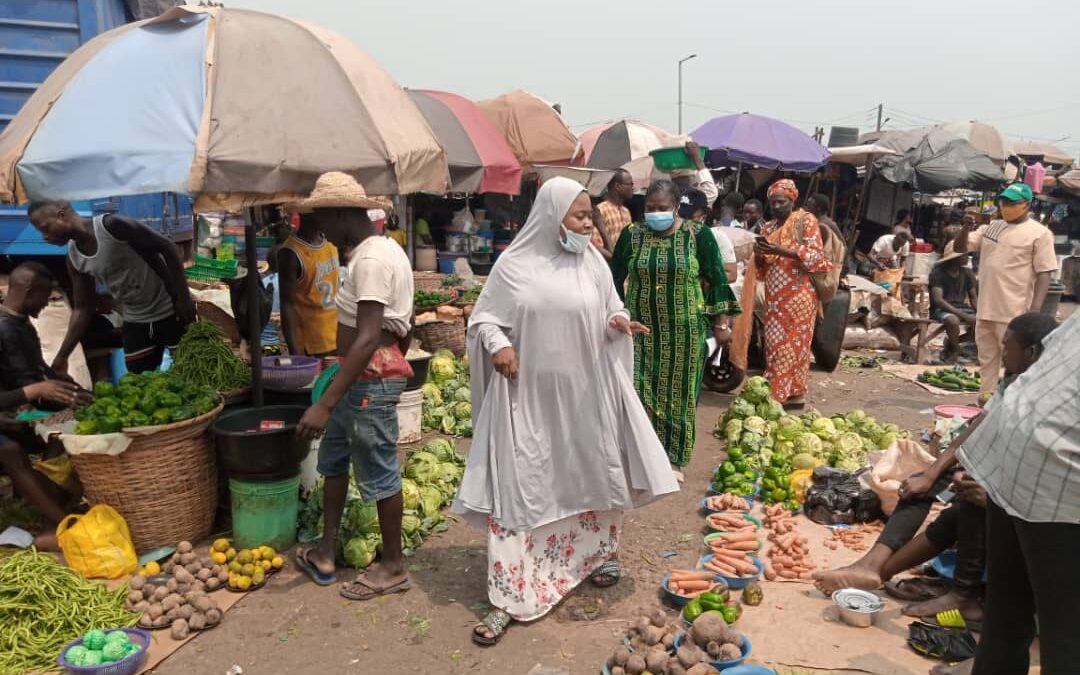
Nov 1, 2021
A magistrate court in Nigeria this week recommended prosecution of a man accused of sexually assaulting a minor in a bustling Lagos open marketplace—and gender rights activists there say the move was the direct result of awareness training conducted with market vendors about their right to violence-free workplaces. Nasiru Umaru, 44, is now in KiriKiri correctional center. The girl was helping her mother make extra money by selling goods, as do many children forced to work in hazardous environments to ensure their families make enough to meet basic needs.
Bringing a case like this is rare in the market, says Onyeisi Chiemeke, an attorney with International Lawyers Assisting Workers network (ILAW), which is aiding with the prosecution. Chiemeke says a newly formed gender-based violence task force in the market brought attention to the alleged rape, and the case now goes to trial in Nigeria’s high court. ILAW, a project established in 2018 by the Solidarity Center, is the largest global network of workers’ rights lawyers and advocates.
Building Synergies to Fight Violence and Harassment
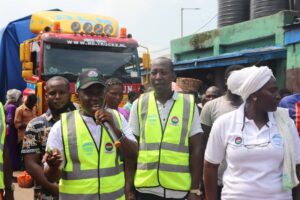
Amina Awal, Hausa language GBVH educator trainer, reaches out to workers in the Mile 12 Lagos market truck park. Credit: Solidarity Center / Nkechi Odinukwe
Following the 2019 adoption of Convention 190 at the International Labor Organization (ILO), union leaders at the Nigeria Labor Congress (NLC), together with the Solidarity Center, began training workers, seeking to put into practice C190’s extensive provisions on preventing and ending gender-based violence and harassment (GBVH) in the world of work.
“I think we are making a lot of progress, a lot of awareness,” says Rita Goyit, head of the NLC’s Department of Women and Youth and secretary of the NLC National Women Commission.
Mile 12 market vendors who took part in the training quickly formed a GBVH task force that worked with the NLC to develop a market code of conduct covering gender-based violence and harassment. The vendors also posted suggestion boxes for reporting GBVH, and the NLC’s Lagos State union chapter leader monitors the submissions and alerts the NLC when necessary.
Vendors also are creating posters to spread awareness and talking with other sellers at the vast, sprawling market, where thousands of people visit each day to buy vegetables, legumes and other food items.
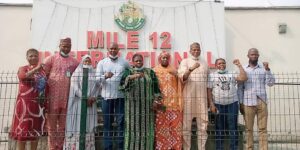
NLC and market leaders at the Mile 12 market in Lagos partnered to raise awareness about gender-based violence and harassment at work. Courtesy: NLC
Key to the success of the trainings, says Goyit, is that they were held in local languages. “That was one of the strategies that really worked—it was a language they understood. People talked one-on-one in the local language.” Vendors from across Nigeria travel to Mile 12, the largest in Lagos, to sell their wares.
The NLC also is joining with unions and allied organizations in urging the government ratify C190. Ratifying an ILO convention signifies a country’s intention to be bound by its terms. Union activists worldwide are campaigning for its ratification, and nine countries have done so.
As the accused man awaits a court hearing, Chiemeke says the synergy between market vendors and lawyers is helping make concrete the rights that Convention 190 provides to violence-free environments.
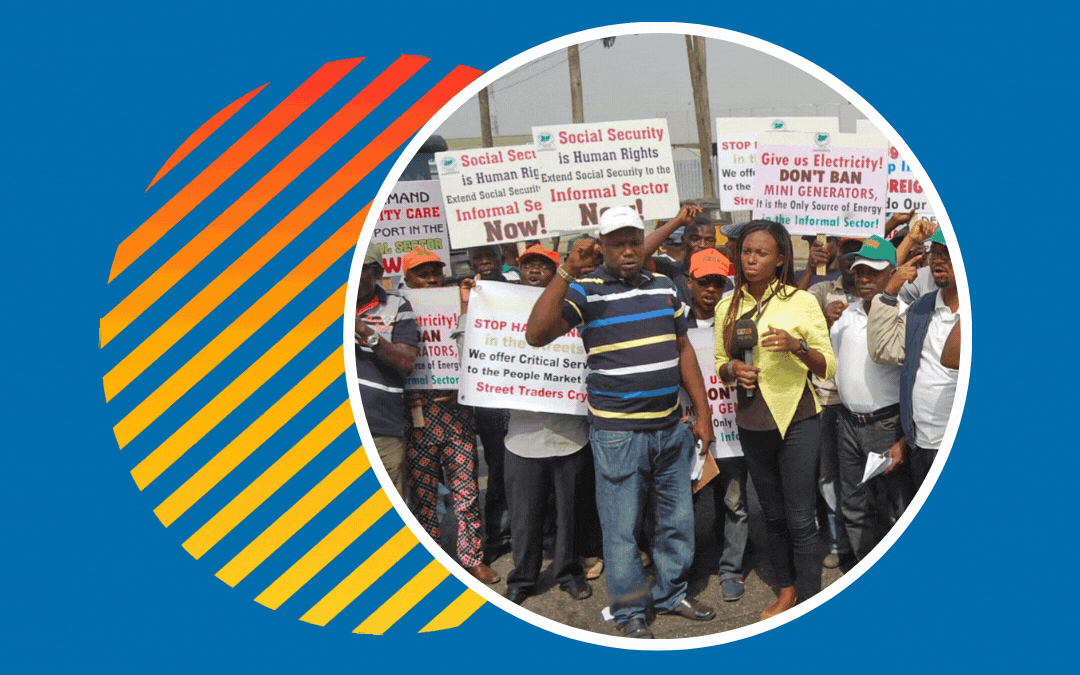
Oct 6, 2021
Worldwide, 2 billion workers perform essential work selling goods in street markets, driving taxis or cleaning homes. The vast majority of these jobs are low wage, with no security and no paid sick leave or health care.
In Nigeria, where more than 80 percent of the population works in informal economy jobs, these workers are joining together to fight for their right to decent work through the Federation of Informal Workers’ Organizations of Nigeria (FIWON), a nationwide association with hundreds of branches across the country.
On the first Solidarity Center Podcast this season, Solidarity Center Executive Director and podcast host Shawna Bader-Blau talks with Gbenga, FIWON founder and general secretary. Gbenga describes how informal economy workers are using their collective power, building coalitions with allied organizations and making key gains, like ending evictions during the COVID-19 pandemic, addressing unfair, burdensome taxation on vendors and, importantly, winning recognition by government and society that they must have the same rights and respect as all workers.
“Poor working people must have access to basic social security, but it doesn’t start with that,” says Gbenga, who goes by one name. “It starts with even the right to work without fear. The right to work without harassment and unnecessary molestation. The right to access public spaces as commonwealth, as something that belongs to all of us.”
Tune In to The Solidarity Center Podcast!
Listen to this and all Solidarity Center episodes here or at iTunes, Spotify, Amazon, Stitcher, Castbox or wherever you subscribe to your podcasts.
The Solidarity Center Podcast, “Billions of Us, One Just Future,” highlights conversations with workers (and other smart people) worldwide shaping the workplace for the better.
Check out recent episodes of The Solidarity Center Podcast.
This podcast was made possible by the Ford Foundation and the generous support of the American people through the U.S. Agency for International Development (USAID) under Cooperative Agreement No.AID-OAA-L-16-00001 and the opinions expressed herein are those of the participant(s) and do not necessarily reflect the views of USAID/USG.
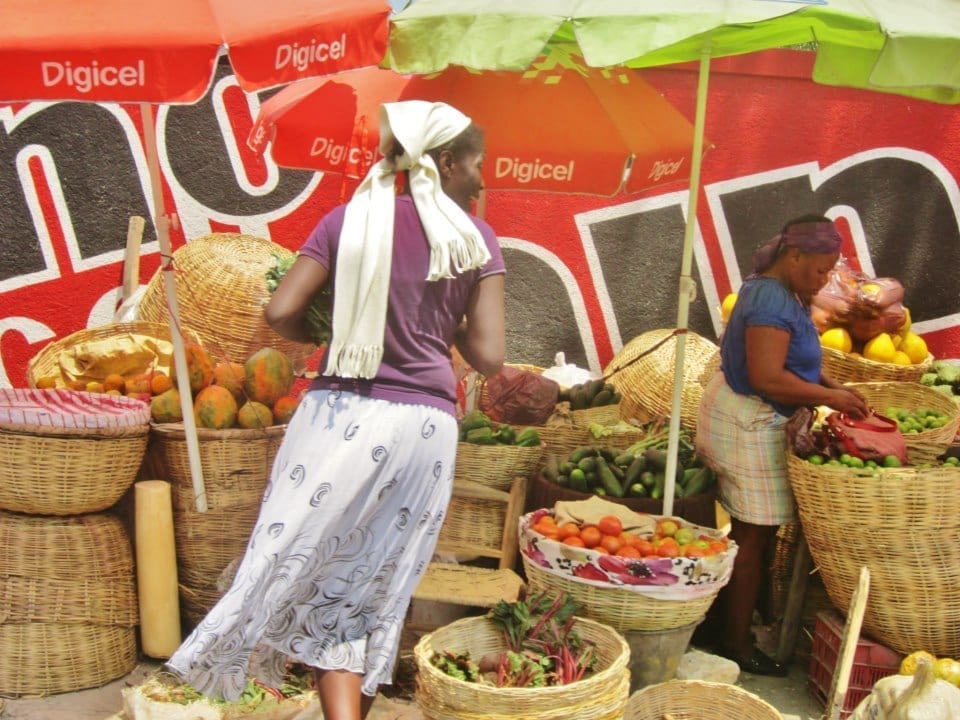
Aug 25, 2021
In Nigeria, through a coordinated campaign by the Organization of Trade Unions of West Africa (OTUWA), West African Informal Sector Workers Network Working Group, Federation of Informal Workers’ Organizations of Nigeria (FIWON), Nigeria Labor Congress (NLC) and Trade Union Congress of Nigeria (TUC), unions are demanding increased government investment in healthcare for informal-sector workers and their families—including the provision of adequate hospitals and clinics in marginalized communities.
“Healthcare is a human right!” said FIWON General Secretary Gbenga Komolafe at a press conference in Abuja this month, adding that the COVID-19 pandemic has further exposed Nigeria’s inadequate healthcare system, especially in the informal sector. “We will use all available legitimate means to push this campaign. We will do rallies and protest on the street.”
NLC and TUC representatives at the conference also lent their organization’s support to the campaign.
Although the Economic Community of West African States (ECOWAS) recommends that member states allocate 15 percent of their budget to healthcare, Nigeria budgets only 4 to 6 percent—among the lowest in Africa, said Komolafe.
The region’s signatory governments are required by ECOWAS Fundamental Principles to promote and protect human rights in accordance with the African Union (AU) Charter on Human and Peoples’ Rights—including provision of social protections such as healthcare—but Nigeria’s workers are not adequately covered, said OTUWA Executive Secretary John Odah.
“We now have a responsibility to … call on government to put more funding into social protection, especially healthcare,” said Odah.
OTUWA’s “Healthcare Is a Human Right” campaign, launched in Abuja in March last year, unites OTUWA affiliates in a fight for equal and fair health care access for all who live within the ECOWAS region.
2 billion informal-sector workers comprising 61 percent of the world’s workforce are not covered or are insufficiently covered by laws or working arrangements guaranteed to formal workers. Although informal-economy workers create more than one-third of the world’s gross national product, they have little power to advocate for social security benefits like healthcare, living wages and safe and secure work. By joining in unions or other worker associations, workers in the informal economy can gain the collective power they need to make change, according to an International Labor Organization (ILO) study.







